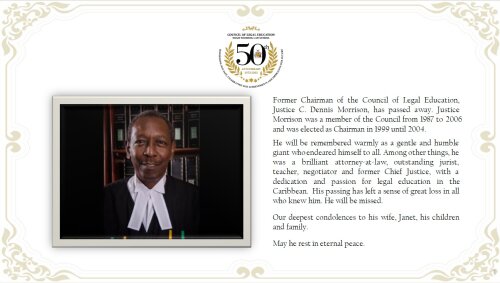Best Bail Bond Service Lawyers in Trinidad and Tobago
Share your needs with us, get contacted by law firms.
Free. Takes 2 min.
Or refine your search by selecting a city:
List of the best lawyers in Trinidad and Tobago
About Bail Bond Service Law in Trinidad and Tobago
Bail bond service in Trinidad and Tobago allows individuals who have been charged with a crime to be released from custody while awaiting their trial. It involves posting a bond, which is a sum of money or property, as a guarantee that the defendant will appear in court. If the defendant fails to appear, the bond may be forfeited.
Why You May Need a Lawyer
You may need a lawyer in bail bond service situations if you or a loved one has been arrested and needs assistance in securing a bond or challenging the amount set by the court. A lawyer can also help navigate the legal process, ensure your rights are protected, and provide guidance on the best course of action.
Local Laws Overview
In Trinidad and Tobago, bail bond service is governed by the Bail Act, which outlines the procedures and requirements for obtaining a bond. The court will consider various factors when setting the amount of bail, including the nature of the offense, the defendant's criminal history, and the likelihood of the defendant appearing in court.
Frequently Asked Questions
1. How is bail set in Trinidad and Tobago?
Bail is set by the court and is determined based on the seriousness of the offense, the defendant's criminal record, and other factors.
2. Can bail be denied in Trinidad and Tobago?
Yes, bail can be denied if the court believes the defendant is a flight risk or a danger to society.
3. Can bail be reduced in Trinidad and Tobago?
Yes, bail can be reduced if circumstances change or if the court believes the original amount was excessive.
4. What happens if the defendant fails to appear in court?
If the defendant fails to appear in court, the bail may be forfeited and a warrant for their arrest may be issued.
5. Can I use property as collateral for a bail bond in Trinidad and Tobago?
Yes, property can be used as collateral for a bail bond in Trinidad and Tobago.
6. Can I appeal the amount of bail set by the court?
Yes, you can appeal the amount of bail set by the court if you believe it is excessive or unfair.
7. How long does it take to secure a bail bond in Trinidad and Tobago?
The process of securing a bail bond can vary, but it generally takes a few days to complete.
8. What are the responsibilities of the person posting bail?
The person posting bail is responsible for ensuring that the defendant appears in court as required and abides by any conditions set by the court.
9. Can bail conditions be modified in Trinidad and Tobago?
Yes, bail conditions can be modified if there is a change in circumstances or if the court deems it necessary.
10. Can a lawyer help with bail bond service in Trinidad and Tobago?
Yes, a lawyer can provide legal assistance and guidance throughout the bail bond service process in Trinidad and Tobago.
Additional Resources
If you need legal assistance in bail bond service matters in Trinidad and Tobago, you may consider contacting the Legal Aid Authority or seeking help from a reputable law firm specializing in criminal law.
Next Steps
If you require legal assistance in bail bond service matters in Trinidad and Tobago, it is advisable to consult with a lawyer who can provide personalized advice and guidance based on your specific situation. Be sure to gather all relevant documentation and information to present to your lawyer for the best possible outcome.
Lawzana helps you find the best lawyers and law firms in Trinidad and Tobago through a curated and pre-screened list of qualified legal professionals. Our platform offers rankings and detailed profiles of attorneys and law firms, allowing you to compare based on practice areas, including Bail Bond Service, experience, and client feedback.
Each profile includes a description of the firm's areas of practice, client reviews, team members and partners, year of establishment, spoken languages, office locations, contact information, social media presence, and any published articles or resources. Most firms on our platform speak English and are experienced in both local and international legal matters.
Get a quote from top-rated law firms in Trinidad and Tobago — quickly, securely, and without unnecessary hassle.
Disclaimer:
The information provided on this page is for general informational purposes only and does not constitute legal advice. While we strive to ensure the accuracy and relevance of the content, legal information may change over time, and interpretations of the law can vary. You should always consult with a qualified legal professional for advice specific to your situation.
We disclaim all liability for actions taken or not taken based on the content of this page. If you believe any information is incorrect or outdated, please contact us, and we will review and update it where appropriate.
Browse bail bond service law firms by city in Trinidad and Tobago
Refine your search by selecting a city.











